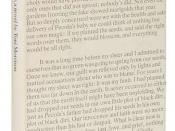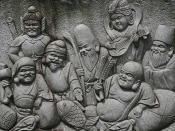In African-American texts, blacks are seen as struggling with the patriarchal worlds they live in order to achieve a sense of Self and Identity. The texts I have chosen illustrate the hazards of Western religion, Rape, Patriarchal Dominance and Colonial notions of white supremacy; an intend to show how the protagonists of Alice Walker's The Color Purple as well as Toni Morrison's The Bluest Eye, cope with or crumble due to these issues in their struggle to find their identities. The search for self-identity and self-knowledge is not an easy task, even more so when you are a black woman and considered a mule and a piece of property. Providing an in depth analysis of these texts, this essay attempts to illustrate how both of these Afro-American writers depict and resolve their respective protagonists' struggles.
Religion is believed by many to serve as a means to achieving or finding self or identity.
However, in the Euro-influenced Christian religion especially, directly after 'finding one's self', one is called to deny one's self in the name of a white 'God'. 'Humble yourself and cast your burdens to God' they say, for 'He will make all wrongs right'. Logically however, one must ask...what interest does the white God (who is especially portrayed in Afro-American writings such as The Color Purple and The Bluest Eye as a further extension of Patriarchal values) have in black people? Moreso, if the Christian bible is so heavily influenced by white man, what interest does the God it portrays have in black women?
In The Color Purple, Celie's original intended audience is a white, male God who does not listen to her prayers, and her letters remain anonymous. Celie explains that she stopped writing to God because he gave her 'a lynched daddy, a crazy...


